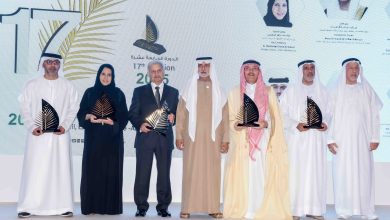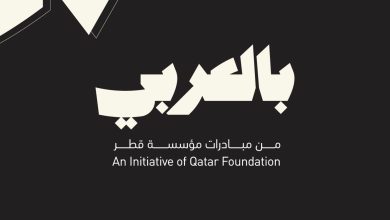Abu Dhabi launches the “International Consortium for Red Palm Weevil Control”
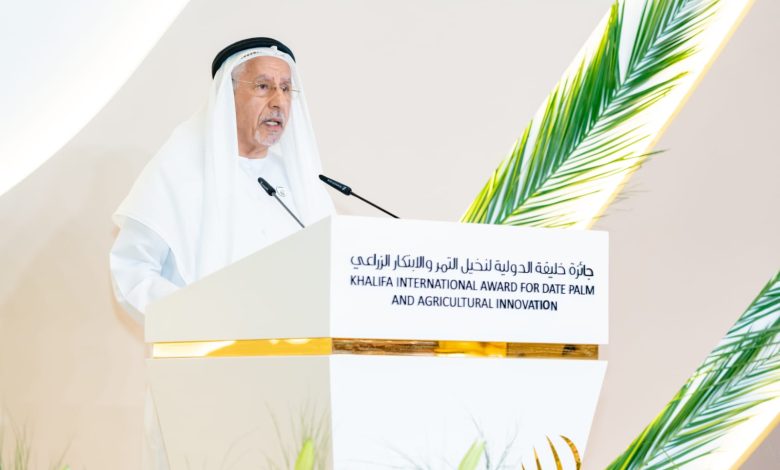
H.E. Sheikh Nahayan Mabarak Al Nahayan: “The Consortium represents an ambitious partnership driven by advancing science and bringing together leading research institutions, governments, and global experts, to confront one of the most devastating threats to palm cultivation.”
Abu Dhabi, April16th, 2025
H.E. Sheikh Nahayan Mabarak Al Nahayan, Minister of Tolerance and Coexistence, Chairman of the Board of Trustees of Khalifa International Award for Date Palm and Agricultural Innovation, announced the launch of the “International Consortium for Red Palm Weevil Control” during H.E.’s speech at the Award’s Winners Honoring ceremony, today. The Consortium, established under the a partnership between the International Affairs Office (IAO) at the Presidential Court and the Gates Foundation, is being launched in collaboration with the International Center for Agricultural Research in the Dry Areas (ICARDA), the Award’s General Secretariat, and a number of national institutions, regional and international organizations. The Consortium’s launch follows the announcement of a new partnership between the UAE and the Gates Foundation at COP28, with a total commitment of $200 million earmarked to support agricultural innovation and development in low and middle income countries. His Excellency described the Consortium as “an ambitious partnership driven by a scientific mission that unites governments, global experts, and leading research institutions to confront a growing global challenge.”
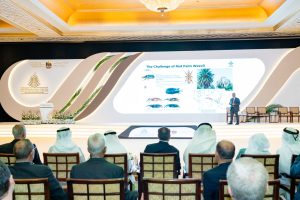
The meeting was attended by representatives of the Consortium’s founding institutions, including Khalfan AlMatrooshi from the International Affairs Office (IAO) at the Presidential Court; Dr. Abdelouahhab Zaid, Secretary General of Khalifa International Award for Date Palm and Agricultural Innovation, Dr. Aly Abousabaa, Director General of ICARDA, along with directors of national institutions and regional and international organizations. The Consortium is funded and overseen by International Affairs Office (IAO) at the Presidential Court and the Gates Foundation, in partnership with the Khalifa International Award for Date Palm and Agricultural Innovation, affiliated with the Erth Zayed Philanthropies – Presidential Court, the International Center for Agricultural Research in the Dry Areas (ICARDA), United Arab Emirates University, the Abu Dhabi Agriculture and Food Safety Authority, and the International Center for Biosaline Agriculture (ICBA).
H.E. Mariam Al Mheiri, Chair of the International Affairs Office (IAO) at the Presidential Court, stated that the “This Consortium builds on the momentum of the UAE becoming the first donor country in the MENA region to join CGIAR System Council, and on our strategic partnership with the Gates Foundation announced at COP28. Together, we are showing the world how science, collaboration, and regional leadership can deliver real impact — not just for our region, but for climate vulnerable communities around the world.
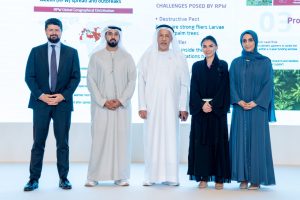
From his side, Dr. Abdelouahhab Zaid, Award’s Secretary General, Erth Zayed Philanthropies – Presidential Court, affirmed that this initiative is rooted in the agricultural innovation partnership announced at the United Nations Climate Change Conference (COP28) between the United Arab Emirates and the esteemed Bill Gates Foundation. He noted that. “Together, we are working not only to protect the economic, cultural, and social value of the date palm,” he said, “but also to develop scalable, environmentally friendly solutions that can support communities in achieving sustainable development.”
Recommended quote for Dr. Zaid, “The Khalifa Award has long championed excellence and innovation in agricultural research, particularly in the cultivation and protection of date palms — a crop that holds deep economic and cultural significance across the region. Through this Consortium, we are proud to bring that legacy forward, scaling scientific solutions that can be shared across borders. This initiative reflects the UAE’s deep commitment to supporting global food security through practical, science-based partnerships.”
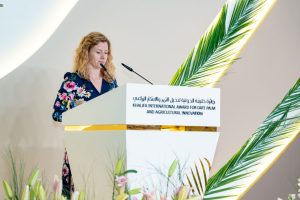
Zahira El Marzouki, Head of Middle East Relations at the Bill & Melinda Gates Foundation, stated:
“Millions of smallholder farmers across low- and middle-income countries depend on crops like the date palm for their livelihoods. This Consortium is a testament to what’s possible when science, leadership, and partnership come together with a shared purpose and build more resilient agriculture systems”
From a scientific perspective, the Consortium will serve as a platform to test, refine technologies in the UAE, and scale and deploy across countries most affected by pest threats.
Aly Abousabaa, Director General of ICARDA, highlighted the importance of scientific collaboration in tackling transboundary agricultural threats, “The Red Palm Weevil is not just a pest — it’s a growing global challenge that demands a coordinated scientific response. Through this Consortium, we are combining the best of CGIAR science, regional knowledge, and local partnerships to deliver real-world solutions. ICARDA is proud to serve as a scientific and implementation lead in this effort, working closely with the UAE and our international partners to protect livelihoods, preserve ecosystems, and ensure the resilience of one of the world’s most iconic crops.”
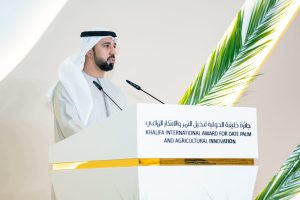
The Consortium will focus on developing science and technologies in the following areas that will utilize the UAE as a test-bed for controlling and containing the Red Palm Weevil, and eventually be transferred and adopted to low and middle income countries.
Workstream 1: Bio-based Innovations
Led by ICIPE (Kenya) – Focuses on nature-based pest control using pheromones, fungi, and classical biocontrol agents.
Workstream 2: Biotechnological Innovations
Led by IITA (Kenya) – Applies advanced tools like genome editing, RNA interference, and microbiome disruption to suppress the pest at a biological level.
Workstream 3: Digital Innovations & AI
Led by ICRISAT (India) – Develops predictive tools, IoT sensors, and AI dashboards for early detection and monitoring of pest outbreaks.
Workstream 4: Good Agricultural Practices (GAPs)
Led by ICBA (UAE) – Designs and promotes scalable field-level practices to improve prevention and complement scientific interventions.
Workstream 5: Policy, Institutions & Global Access
Led by ICARDA (UAE Regional Hub) – Works to embed scientific innovations in national policies and
The UAE, through this Consortium, is reaffirming its position as a science-driven, impact-oriented partner to vulnerable agricultural communities — bringing innovation to where it is needed most.


